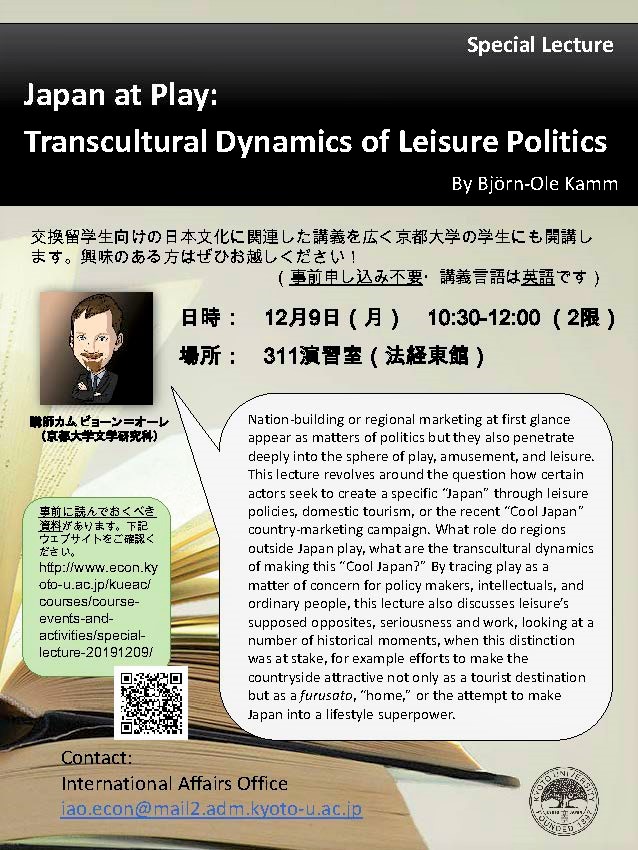Special Lecture “Japan at Play: Transcultural Dynamics of Leisure Politics”
East Asia Sustainable Economic Development Studies, Graduate School of Economics is holding a special lecture on “Japan at Play: Transcultural Dynamics of Leisure Politics” in December. Please feel free to come!
Date: December 9 (Mon), 2019
Time: 10:30-12:00 (2nd period)
Place: Room 311 (Law-Economics East Building, 3F)
No registration is needed but attendants are required to read the following readings beforehand.
- Leheny, David. 2003. “Good and Bad Words in Japanese Leisure Policy in the 1970s.” In The Rules of Play: National Identity and the Shaping of Japanese Leisure, 73-101. Ithaca: Cornell University Press.
*Click here to download a copy. - White, Daniel. 2011. “The Affect-Emotion Gap: Soft Power, Nation Branding, and Cultural Administration in Japan.” Doctoral Dissertation, Houston, Texas: Rice University. Therein: Chapter Five – Nation Branding: Neo-Japanesque and Cool Japan, pp. 135-157.
*Click here to download a copy.
Abstract of the lecture: Nation-building or regional marketing at first glance appear as matters of politics but they also penetrate deeply into the sphere of play, amusement, and leisure. This lecture revolves around the question how certain actors seek to create a specific “Japan” through leisure policies, domestic tourism, or the recent “Cool Japan” country-marketing campaign. What role do regions outside Japan play, what are the transcultural dynamics of making this “Cool Japan?” By tracing play as a matter of concern for policy makers, intellectuals, and ordinary people, this lecture also discusses leisure’s supposed opposites, seriousness and work, looking at a number of historical moments, when this distinction was at stake, for example efforts to make the countryside attractive not only as a tourist destination but as a furusato, “home,” or the attempt to make Japan into a lifestyle superpower.
Additional Readings (FYI)
-
- Abel, Jonathan E. 2011. “Can Cool Japan Save Post-Disaster Japan? On the Possibilities and Impossibilities of a Cool Japanology.” International Journal of Japanese Sociology 20 (1): 59–72.
- Allison, Anne. 1994. “Structure of Japanese Play.” In Nightwork: Sexuality, Pleasure, and Corporate Masculinity in a Tokyo Hostess Club, 114-123. Chicago: University of Chicago Press.
- Apter, Michael J. 1991. “A Structural-Phenomenology of Play.” In Adult Play: A Reversal Theory Approach, edited by Michael J. Apter and J.H. Kerr, 13–29. Amsterdam: Swets & Zeitlinger.
- Cox, Rupert. 2002. “Is There a Japanese Way of Playing?” In Japan at Play: The Ludic and Logic of Power, edited by Joy Hendry and Massimo Raveri, 169–185. London, New York: Routledge.
- Law, John. 2003. “Ordering and Obduracy.” Centre for Science Studies, Lancaster University.
- Linhart, Sepp, and Sabine Frühstück, ed. 1998. The Culture of Japan as Seen Through Its Leisure. Albany: State University of New York Press.
- McLelland, Mark, ed. 2017. The End of Cool Japan: Ethical, Legal, and Cultural Challenges to Japanese Popular Culture. New York: Routledge.
- Robertson, Jennifer. 1988. “Furusato Japan: The Culture and Politics of Nostalgia.” International Journal of Politics, Culture, and Society 1 (4)): 494–518
Contact: Graduate School of Economics, International Affairs Office
iao.econ [at] mail2.adm.kyoto-u.ac.jp (replace [at] with @)
